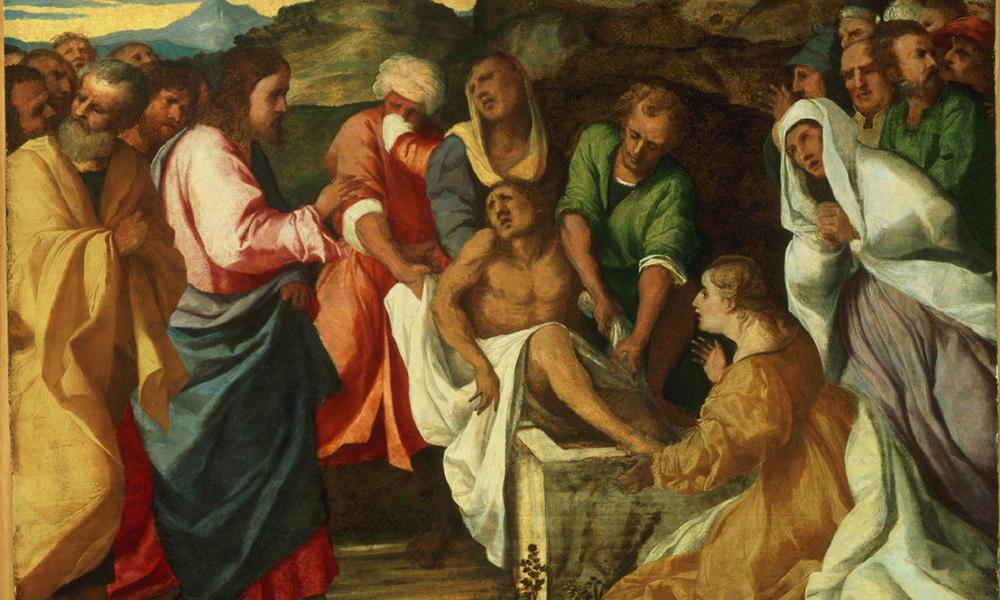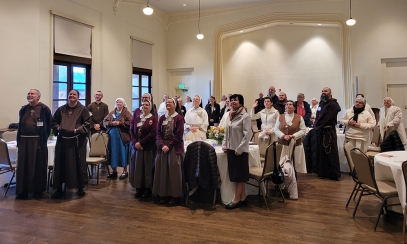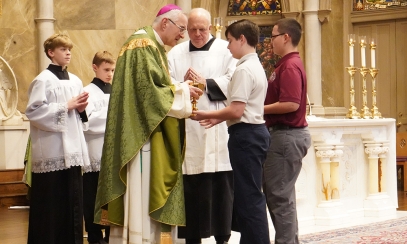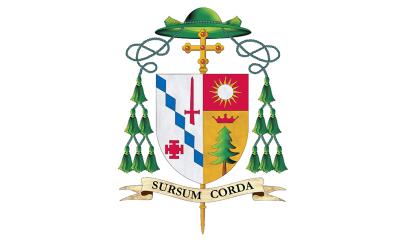
‘Untie Him and Let Him Go’
Bishop Raica Celebrates the Fifth Sunday of Lent
Bishop Raica Celebrates the Fifth Sunday of Lent
On April 3, Bishop Raica celebrated Mass at the Cathedral of St. Paul, marking the fifth Sunday of Lent. The complete text of his homily follows herein.
On April 3, Bishop Raica celebrated Mass at the Cathedral of St. Paul, marking the fifth Sunday of Lent. The complete text of his homily follows herein.
My brothers and sisters in Christ, here at the Cathedral of St. Paul, we are using the readings from Cycle A as our catechumens prepare to enter the Church at our Easter Vigil. These past few weeks we heard about the woman at the well and her thirst not just for literal water, but her deeper desire for the living water in her life. Last week, we heard of the man born blind who, through the intervention and power of Christ, was not only able to see literally, but figuratively by recognizing something deeper in the person of Christ. It was a sight which enabled him to believe – a sight that goes beyond literal seeing. Today, we turn our attention to the third part of this liturgical tryptic – the man Lazarus, who was raised from the dead by Jesus.
From the Gospel we learn that he was, indeed, a friend of Jesus. Having become gravely ill, his two caring sisters immediately asked Jesus for help. The message was simple like a text message, “Master, the one You love is ill.” Don’t we do that, too, in our needs: “Lord, someone You love is ill.” Jesus heard their plea. Through a series of unidentified circumstances, Jesus was delayed in responding. In the meantime, Lazarus died. Then, amidst their tears at the loss of their loved one, our Lord arrived amidst their sadness: “Lord, if You had been here, he would not have died.” There is something about the very presence of Christ that evokes life, and hope, and optimism.
Today, the story of Lazarus out of the hills of Bethany can be relocated it in our time, in our city, our homes, our hearts. It illustrates the tremendous power of Jesus, foreshadows His own death and resurrection, and provides some rather rare insights into His dealings and relationships with people in their need.
For each one of us, there is something that has a firm grip on us paralyzing us, keeping us from the life God dreams for us.
Our imagination creates Hollywood-esque, Cecil B. DeMille versions of the raising of Lazarus: the dead man coming out of the tomb, bound like an Egyptian mummy, wrapped tightly in his burial garments (much different than the “restful slumber” of our own burial customs), along with the accompanying drama of a “stench.”
Think about Lazarus, though. Those tight wrappings around his body even as he comes forth, restrict his sight, garble his speech, compromise his movement. “Untie him,” commanded Jesus, “and let him go.”
What about us? What is it in our own lives that binds us, that quite literally, “ties us up in knots?” What paralyzes us for whatever reason? What limits our perception of the right thing to do or about what we are unable to speak? What creates a certain unease - dis-ease - or “stench” about us?
What comes to our minds right now - or maybe is on our minds all the time – or is like a prison or tomb of pre-occupation and worry? Don’t we, too, hear the words of our Lord whispering in our ear: “Untie them, … and let them go.”
Is it an attitude? A prejudice or envy toward someone or toward us? Is it something that worries us? Something that we did in the past? Something now in the present that weighs us down that we can’t seem to break? A financial difficulty? A health concern? A fragile relationship? “Untie them and let them go free!”
Jesus did not deny the presence of difficulties, the reality of the cross, the fact of death. Even Lazarus had to die again. Jesus did not prevent his escape, his mortality or suffering a second time.
What Jesus did promise, however, was that His power, His Word, would overwhelm any force that diminishes human life, even the power of death. Ultimately, He would be victorious over death. Life prevails! And this was even more convincingly demonstrated in His own resurrection that we will celebrate in a special way just two weeks from today!
During our Lenten journey, we are invited by the Lord to “come out” of our tombs. What a great step in faith that must have been, even for Lazarus!
We are called to come out of whatever tomb the difficulties of life have buried us in, allowing the power of Jesus to untie us and let us go free: free in His Spirit, knowing that we do not face the challenges of life and our identity alone. It is not something I have to make for myself, for Christ has given me my identity in Him!
These past three weeks of Lent have provoked us to consider some rather important concepts of our Christian faith that are addressed more intensely with those planning to enter the Church at Easter. The woman at the well encountered Christ in the midst of her daily task of going to the well for water. Jesus promised her that He would give her “living water”! She responded, “Give me this water always!” Our thirst for something we lack causes us to search for that which will quench it.
Then, last week, we heard that evocative story of the blind man cured by Jesus. He can see. He can understand. Christ’s light has shone on him so that he can walk without bumping into things. He experiences a fullness of life and freedom that was otherwise impossible.
Today, Lazarus is raised, the anguish of separation is bridged by the joy of Christ. Death does not have the final say in life. Our lives cry for something more - to be found, to be healed, to be saved and, in the end, to be spared death into nothingness. As we thirst (the woman at the well) for light (the blind man) and life (Lazarus), our Lord reminds us that He alone is the “way, the truth and the life.” In all freedom of choosing Him, He gives us a way out of our human predicament to follow Him into the fulfillment of all our (of God’s) dreams and hopes. There is nothing else that I am aware of that makes such a dramatic claim and demonstrably bears it out.
My friends, our faith is more than a mere “add-on” to life - or something to comfort us when we are down, or a backdrop for marriages, or a social etiquette, or a type of control for children. Even more so, it is a way that opens us to a person Who satisfies our longings, Who tells us about ourselves, gives us our true identity, and how we can live a new way unchained from factors that limit our lives. It gives us hope that our lives have a true value as we journey toward our ultimate union with Christ, Who satisfies our thirst, helps us to see, and enables us to live in the fullness of our humanity for Him.
This weekend we hear those telling words again, “Untie him, untie her ... let him / her go free.” Like the evocative image of Our Lady, the Undoer of Knots, in knowing the mercy of Christ, especially in the sacrament of penance and our Lenten observances, we will experience, once more, a greater freedom of our life in Christ because we can go to our Lord Who frees us from all that besets us. May God bless you!



